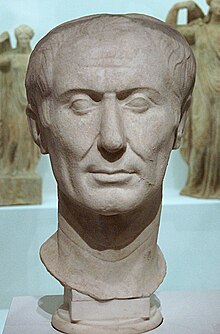 Gaius Julius Caesar[b] (Classical Latin orthography: CAIVS IVLIVS CAESAR, Classical Latin: [ˈɡaː.i.ʊs ˈjuː.li.ʊs ˈkae̯.sar]; 13 July 100 BC[1] – 15 March 44 BC[2]), mostly known as Julius Caesar (Classical Latin: IVLIVS CAESAR), was a Roman politician, general, and notable author of Latin prose. He played a critical role in the events that led to the demise of the Roman Republic and the rise of the Roman Empire.
Gaius Julius Caesar[b] (Classical Latin orthography: CAIVS IVLIVS CAESAR, Classical Latin: [ˈɡaː.i.ʊs ˈjuː.li.ʊs ˈkae̯.sar]; 13 July 100 BC[1] – 15 March 44 BC[2]), mostly known as Julius Caesar (Classical Latin: IVLIVS CAESAR), was a Roman politician, general, and notable author of Latin prose. He played a critical role in the events that led to the demise of the Roman Republic and the rise of the Roman Empire.
In 60 BC, Caesar, Crassus, and Pompey formed a political alliance that dominated Roman politics for several years. Their attempts to amass power as Populares were opposed by the Optimates within the Roman Senate, among them Cato the Younger with the frequent support of Cicero. Caesar's victories in the Gallic Wars, completed by 51 BC, extended Rome's territory to the English Channel and the Rhine. Caesar became the first Roman general to cross both the Channel and the Rhine, when he built a bridge across the Rhine and crossed the Channel to invade Britain.
These achievements granted him unmatched military power and threatened to eclipse the standing of Pompey, who had realigned himself with the Senate after the death of Crassus in 53 BC. With the Gallic Wars concluded, the Senate ordered Caesar to step down from his military command and return to Rome. Caesar refused the order, and instead marked his defiance in 49 BC by crossing the Rubicon with the 13th Legion, leaving his province and illegally entering Roman Italy under arms.[3] Civil war resulted, and Caesar's victory in the war put him in an unrivalled position of power and influence.
----------------------------------------------------------------------------------------------------------------------------------
The Gallic Wars were a series of military campaigns waged by the Roman proconsul Julius Caesaragainst several Gallic tribes. Rome's war against the Gallic tribes lasted from 58 BC to 50 BC and culminated in the decisive Battle of Alesia in 52 BC, in which a complete Roman victory resulted in the expansion of the Roman Republic over the whole of Gaul (mainly present-day France and Belgium). While militarily just as strong as the Romans, the internal division between the Gallic tribes helped ease victory for Caesar, and Vercingetorix's attempt to unite the Gauls against Roman invasion came too late.[1][2] The wars paved the way for Julius Caesar to become the sole ruler of the Roman Republic.
Although Caesar portrayed this invasion as being a preemptive and defensive action, most historians agree that the wars were fought primarily to boost Caesar's political career and to pay off his massive debts. Still, Gaul was of significant military importance to the Romans, as they had been attacked several times by native tribes both indigenous to Gaul and farther to the north. Conquering Gaul allowed Rome to secure the natural border of the river Rhine. The Gallic Wars are described by Julius Caesar in his book Commentarii de Bello Gallico, which remains the most important historical source regarding the conflict.[3]
No comments:
Post a Comment